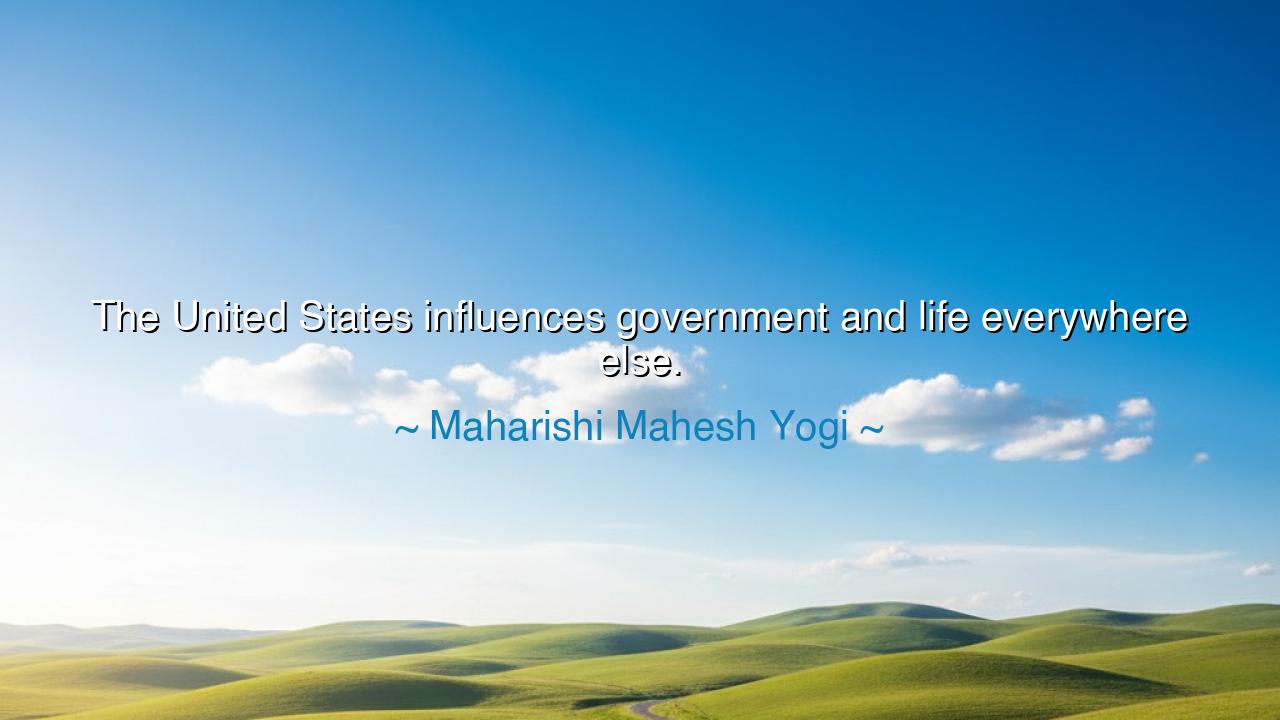
The United States influences government and life everywhere else.






The words of Maharishi Mahesh Yogi — “The United States influences government and life everywhere else.” — fall like a quiet revelation upon the ears of those who ponder the nature of power in the modern age. Spoken not in accusation, but in recognition, they unveil a truth both magnificent and sobering: that the destiny of one great nation has become intertwined with the destiny of the world itself. In these words, the Maharishi, a sage of peace and spiritual awakening, reminds mankind that influence, like light, can nurture or burn, depending on the hand that holds it. The United States, born of revolution and freedom, stands as both example and warning — for those who lead in power also lead in responsibility.
When the Maharishi spoke these words, he was not a statesman of politics, but of the soul. He saw with the eyes of one who looked beyond borders and armies, perceiving the invisible threads of influence that stretch across the world. From its founding, the United States had risen to a position unlike any seen before in human history — a republic whose ideals of liberty, equality, and enterprise resonated far beyond its shores. Its culture, its markets, its inventions, and its governance had become the rhythm by which other nations measured their own progress. Whether in admiration or defiance, the world responded to America’s every move. Such power is not mere dominance; it is a shaping force, molding thought, law, and life across the globe.
The truth of this influence can be seen across the centuries. In the wake of World War II, when much of the world lay in ashes, it was the United States that helped rebuild nations through the Marshall Plan, lifting Europe from despair and preventing chaos from swallowing it whole. Later, during the Cold War, the contest between liberty and totalitarianism revolved not around mere weapons, but around ideas — freedom, democracy, and human rights — ideals that found their most powerful expression in America. The fall of the Berlin Wall, though born of many hands, was inspired by a universal yearning that America had long embodied: that the human spirit, once awakened, cannot be caged. Thus, through its example and its power, the United States influenced not only governments, but the very spirit of the age.
Yet the Maharishi’s words carry a deeper wisdom — a spiritual reminder that influence is not without consequence. The one who shapes the world also bears the world’s karma. A nation that spreads its ideals spreads also its flaws. The same America that inspired hope through its Declaration of Independence also cast shadows through war, consumption, and cultural excess. In its quest to lead, it sometimes forgot the humility that sustains leadership. And thus the Maharishi’s observation becomes a mirror — reflecting not only greatness, but the burden of being a model to humanity. Influence, when wielded without wisdom, can enslave rather than liberate.
From the view of the ancients, this is the cycle of empire repeated — for even the brightest torch can burn the hand that holds it. In the time of Rome, the empire spread law and order across continents, yet in its arrogance it sowed the seeds of decay. The Maharishi, as a teacher of inner peace, would have understood this parallel well: that true strength does not lie in control over others, but in mastery over oneself. For only a nation at peace within can guide the world toward peace without. When America acts from its highest values — freedom, compassion, and justice — it uplifts the world. But when it acts from fear or greed, it casts darkness even upon its allies.
Still, there is hope and purpose in these words. To recognize influence is to awaken responsibility. If the United States truly shapes the destiny of the world, then it must also lead by example — not only in power, but in wisdom, integrity, and unity. Its citizens must remember that their actions, their choices, their voices ripple far beyond their borders. The way Americans treat one another, the way they uphold justice and truth, becomes a model that others emulate. The Maharishi, who taught meditation as a means to peace, understood that change begins within — that a nation of awakened minds can become a beacon for all humanity.
So let this be the lesson for all who hear: influence is both a gift and a duty. The stronger the hand, the greater the care it must take in its touch. Whether as a nation or as individuals, we are all participants in the shaping of our world. The United States may lead by its might, but it will endure only by its moral clarity. Let those who wield influence — in government, in business, in spirit — act not from pride, but from purpose. For as the Maharishi teaches, power guided by peace can uplift the earth, but power without peace will bring it to ruin.
And thus, remember this truth, passed down like ancient counsel: to influence the world is to bear the world’s heart in your hands. Treat it with reverence, act with wisdom, and let every deed — whether of one nation or one soul — serve not dominion, but harmony. For in the end, the greatest power is not to rule the world, but to inspire it.






AAdministratorAdministrator
Welcome, honored guests. Please leave a comment, we will respond soon